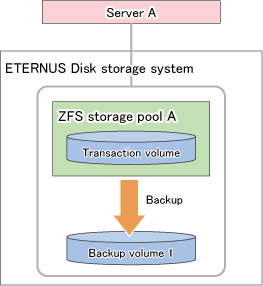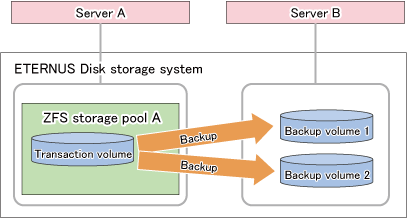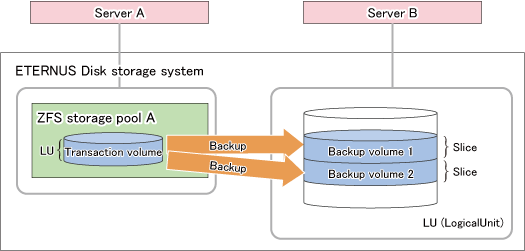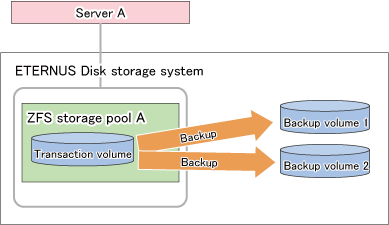When you design your storage pools and backup operation, pay attention to the following aspects:
Unit of backup and restoration: storage pool
AdvancedCopy Manager supports backup and restoration only in units of ZFS storage pools. Backup in units of ZFS file systems is not available.
For details, refer to "G.1.1 Units of backing up".
Types and configurations of ZFS storage pools
With AdvancedCopy Manager, you can back up and restore system areas (ZFS root pools) as well as data areas (usual storage pools).
For backing up and restoring system areas (ZFS root pools), you have to stop the system. For details, refer to "Backup and restoration of system areas".
Before backing up and restoring data areas, you have to disconnect them from the system. For details, refer to "Backup and restoration of data areas".
AdvancedCopy Manager supports the following devices (physical disks) in a ZFS storage pool configuration.
The same devices are supported as for replication management and AdvancedCopy Manager CCM, respectively.
For details on supported devices when using replication management, refer to "1.5 Managing a Device on AdvancedCopy Manager".
If you use SDX object of PRIMECLUSTER GDS/SafeDISK, only operation in units of slices is available in offline backup operation where replication between servers is performed.
With AdvancedCopy Manager CCM, copying is implemented by specifying disks in the ETERNUS Disk storage system, while there is no processing of the devices from the operating system to which they are connected. Therefore, if you are using, for example, the Logical Volume Manager of GDS, consistency with the Logical Volume Manager can possibly not be guaranteed.
If you are using Logical Volume Manager volumes, use replication management.
Point
For information on how to create a ZFS storage pool, refer to the manuals of each device.
As devices (physical disks) in a ZFS storage pool configuration, entire disks (LUs) and slices are supported.
However, the units by which AdvancedCopy Manager can back up and restore depend on the AdvancedCopy Manager function you are using (replication management or AdvancedCopy Manager CCM) and the device types (usual device or SDX object of GDS) constituting the ZFS storage pool. For details, refer to the articles on functions and device types in the "ETERNUS SF AdvancedCopy Manager Operation Guide" and the "ETERNUS SF Operation Guide for Copy Control Module".
Note
A ZFS storage pool configuration which contains both of entire disks (LUs) and slices is not supported.
For backup in the system areas, you have to specify the entire disks (LUs) as backup sources.
Note
For using AdvancedCopy Manager CCM
The only available unit of backup in AdvancedCopy Manager CCM is "entire disk" (LU). If you want to use AdvancedCopy Manager CCM to back up storage pools that consist of slices, you have to specify the LUs that contain these slices as backup sources.
In this case, however, since the entire LU will be copied, all other slices in the LU will be copied at the same time. Therefore, in your storage pool configuration and backup operation, pay attention to the following points:
Define the entire LU as a single slice. Alternatively, embed all slices from the same LU into the same storage pool.
If multiple storage pools consist of different slices that are in the same LU, back up or restore all of these storage pools simultaneously.
Preparing a backup volume
A backup volume must fulfill the conditions and have a configuration as described below.
For any conditions that are not stated below, depending on the type of device in the backup source volume, refer to "1.5 Managing a Device on AdvancedCopy Manager", "Chapter 6 Replication", or the "ETERNUS SF Operation Guide for Copy Control Module".
Combinations of backup sources and targets
Backup sources and targets can be combined as shown below. Note, however, that available combinations depend on the device types, so, depending on the device types you are using, some combinations are not available.
Backup source | Backup target | |
|---|---|---|
Slice | LUN | |
Slice | Yes | No |
LUN | Yes | Yes |
Make sure that the backup volume has the same physical disk configuration (number of disks, sizes, and redundant configuration) as the ZFS storage pool that is the backup source.
If a ZFS storage pool consists of multiple physical disks, you have to use a backup volume whose physical disks all have the same size.
Likewise, if the backup source is a slice, arrange for a backup target that has the same number and sizes of slices.
Moreover, if the backup source is a LU and the backup target a slice, arrange for the same number and sizes for each.
Point
For backing up multiple generations
Refer to "Handling of backup volumes (destination devices)".
Notes on design
For operation, pay attention to the points below, so that devices (*) in the same storage pool on the same server do not appear as multiple ones.
Do not connect backup target volumes (copy destination devices) to backup source servers.
Do not connect multiple backup target volumes (copy destination devices) to the same server.
(*) Backup source volumes (copy source devices) and backup target volumes (copy destination devices) in the same storage pool
Figure G.4 Example for unsupported connection of backup target volume: backup target volume connected to backup source server

Figure G.5 Example for unsupported connection of backup target volumes: multiple backup target volumes connected to same server

Depending on the function you are using, respond as follows:
For using replication management function
Connect copy destination volumes to servers (e.g. backup servers) other than the copy source volumes. (Perform replications from server to server.)
For backing up multiple generations to the same backup server, the device combination should be "LU" for the copy source and "slice" for the copy destination.

For using AdvancedCopy Manager CCM
Connect copy destination volumes to servers other than the copy source volumes, or, alternatively, operate without any server connection.
For copying multiple generations, do not connect the copy destinations to servers.
